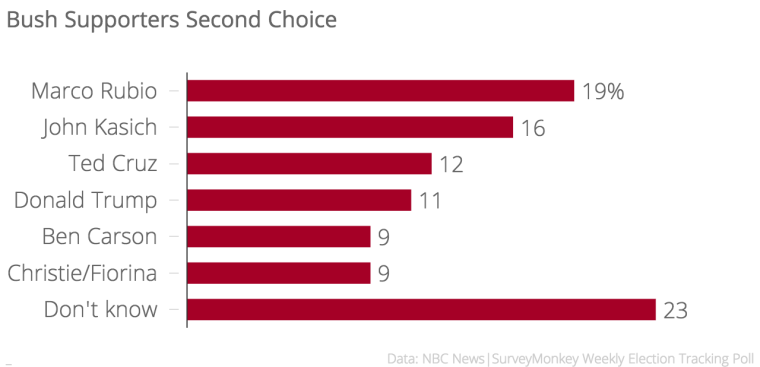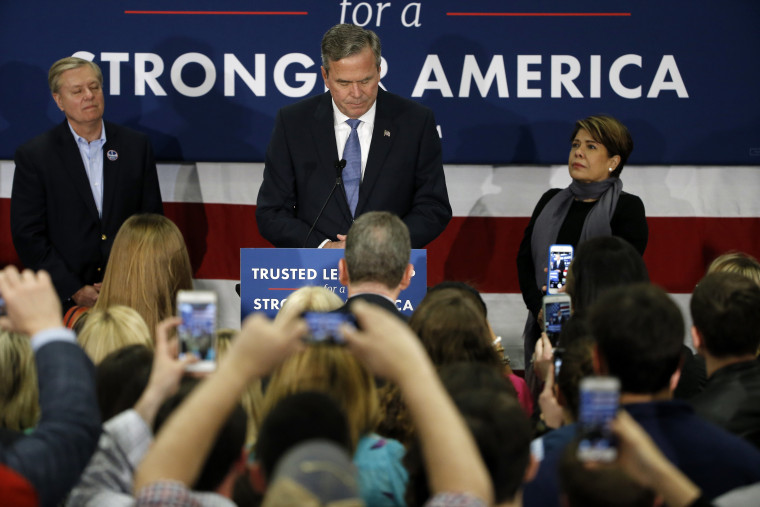With Jeb Bush dropping out of the Republican presidential race after the first three state contests, the big question is whether the move will benefit Marco Rubio. Many have speculated for weeks that if Bush or John Kasich were to leave the race, Rubio would benefit by consolidating the “establishment” vote. Striking a familiar contrarian tone, Donald Trump has disagreed—suggesting that he could benefit as the field winnows and Republican voters are forced to choose new candidates.
Rather than trying to parse the tea-leaves by comparing the demographics of Bush supporters to the supporters of the remaining candidates, we did something very simple: We asked Bush supporters what they thought.
According to results of the NBC News|SurveyMonkey Weekly Election Tracking poll that was in the field between February 8 and February 14, and which interviewed 13,129 adults, we asked respondents who their second choice would be. By looking at the second choice for the 195 Bush supporters, we can get a very good indication of how the race is likely to shake out. While the sample is relatively small, and we must be somewhat cautious in our interpretation as a result, it is only because we are interviewing so many people every week that we are able to dive deeper into the numbers to explore questions that most polls are unable to examine.

The data tells a story that is not nearly as encouraging for Rubio as some have assumed. Among Bush supporters, those who have a second place preference – and nearly a quarter of Bush supporters did not – split their preference among the field. While Rubio gets the support of 19 percent of Bush supporters, this is only slightly more than Kasich (16 percent) and Cruz and Trump are not far behind (12 percent and 11 percent respectively). While we might speculate that the support for Kasich may be a bit high given that the poll was taken following his second-place finish in the New Hampshire primary, the basic takeaway is that it is not at all obvious that the departure of Bush will do much to improve Rubio’s base of support.
Of course, perhaps the 23 percent who do not know may all swing to Rubio, but it seems just as likely to think that they either end up splitting their support– as the other Bush supporters seem likely to do – or else their enthusiasm in the rest of the field might be such that they decide to sit the rest of the primary campaign out.
It is important to note that these conclusions are based on data collected before the South Carolina Republican primary, and it is possible that the dynamics of the race have changed since the poll was taken. Maybe Trump’s dominant performance, in which he won all but two counties in the Palmetto State and a perfect 50-out-of-50 delegates, attracts more supporters? Or else perhaps the fact that Rubio was able to best Cruz for second place creates more enthusiasm for his candidacy, despite the fact that he didn’t win a single delegate. Regardless, our unique data suggest that it seems unlikely that a dramatic consolidation will occur just because candidates decide to exit. As is often the case, the data tell a slightly messier story than is being reported by some.
The NBC News|SurveyMonkey Weekly Election Tracking poll was conducted online from February 8, 2016 through February 14, 2016 among a national sample of 13,129 adults aged 18 and over, including 11,417 who say they are registered to vote. Respondents for this non-probability survey were selected from the nearly three million people who take surveys on the SurveyMonkey platform each day. Results have an error estimate of plus or minus 1.1 percentage points for the full sample and plus or minus 7.5 for Bush voters.
